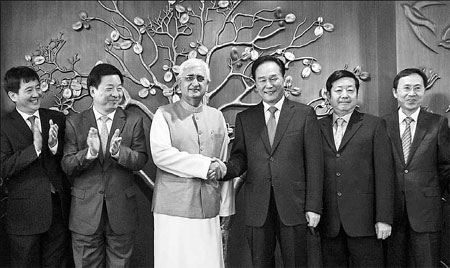China, India ask media outlets to promote progress in relations
Journalists from China and India are being encouraged to boost exchanges and report more extensively on cooperation between the two countries, especially when sensitive issues are resolved, a senior Chinese official said on Monday.
"I hope China and India will gradually station more reporters in each nation, or send more reporters to conduct interviews, meet local residents and gather real, fresh and firsthand information," said Cai Mingzhao, minister of the State Council Information Office, at the first China-India Media Summit in New Delhi.
More than 50 Indian and Chinese officials, journalists, scholars and experts participated in the summit. Cai praised media outlets from each nation for safeguarding the strategic partnership, but said more must be done.
"Chinese and Indian media still do not have a sufficient understanding of each other's country. (Their reports) still cannot fully reflect the friendly bilateral relations and still cannot meet the demands for information about each country," Cai said.
Media in both countries should shoulder the responsibility of learning from each other and create a favorable atmosphere for mutual understanding, he said.
The two countries agreed to hold the media summit during Premier Li Keqiang's first official visit to New Delhi in May since assuming office.
During the summit, journalists and researchers from both nations discussed the current media landscape in China and India and the development and influence of new media.
Cai said the summit should be transformed into a permanent platform where media organizations from both countries are able to seek opportunities for cooperation, such as exchanges of staff and articles. Salman Khurshid, Indian minister of external affairs, said it is important that Chinese and Indian media outlets learn to trust each other and understand each nation through a "common language".
Chinese analysts said the media plays a significant role in China-India ties, but that some media outlets do not fully comprehend how important the relationship is.
"Malicious media hype can quickly dampen public opinions on how the two peoples perceive each other and consequently trigger emotional confrontations," said Lan Jianxue, a researcher of South Asian studies at the China Institute of International Studies.
"Generally, the China-India relationship has two versions: the media-influenced version and the one based in reality. The media-influenced version is always more intense, gray and pessimistic," Lan said. "The value of reporting China-related or India-related news is not in making unverified assumptions or exaggerations but in the promotion of progress in bilateral relations."
In response to recent reports that India successfully test-fired a missile that can reach Beijing, Chinese Foreign Ministry spokesman Hong Lei called on the media from both countries on Monday to do more to develop Sino-Indian relations and promote stability in the region.
Lan added: "China and India are natural strategic partners. The two sides should enhance cooperation and deepen trust," Hong said.
Xinhua contributed to this story.
puzhendong@chinadaily.com.cn
|
Cai Mingzhao (third from right), minister of the Information Office of the State Council, shakes hands with Salman Khurshid, Indian minister of external affairs, during the convention of the first China-India Media Summit in New Delhi on Monday. Zheng Huansong / Xinhua |
(China Daily 09/17/2013 page11)









